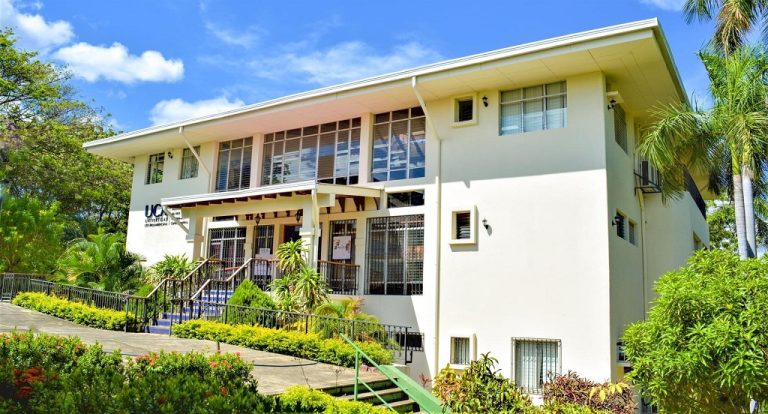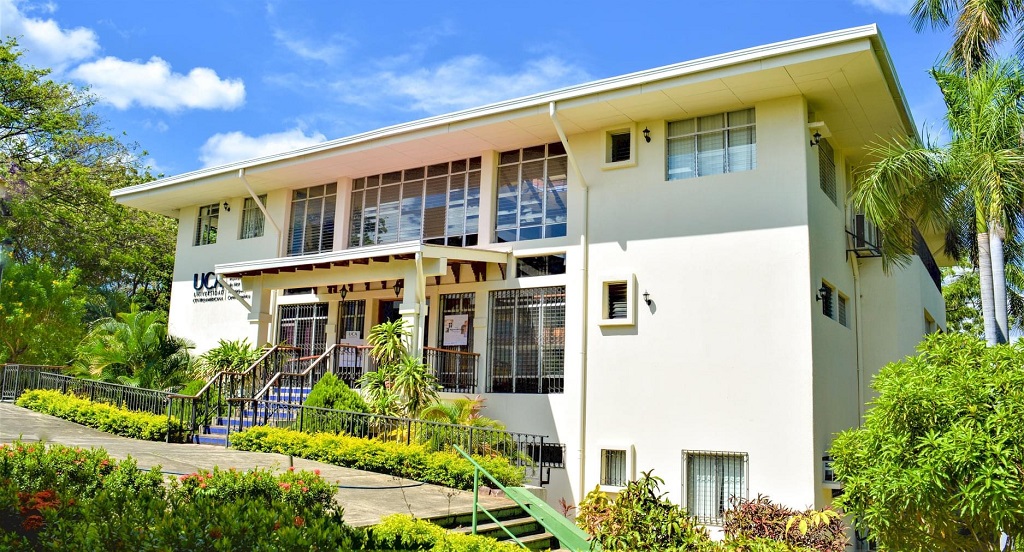26 de agosto 2023

Children of Exile: The Births “Sowing Hope” in the Camp of Nicaraguan Farmers

PUBLICIDAD 1M
PUBLICIDAD 4D
PUBLICIDAD 5D
The Historical Institute’s collection contains nearly 70,000 volumes & documents, going back to the XVI century

View of the confiscated building of the Nicaraguan and Central American Historical Institute on the former UCA campus. Photo from the UCA website.
The misadventures of William Walker and his passage though Nicaragua and Central America in the nineteenth century captivated Victor Hugo Acuña long before he became a renowned historian in Costa Rica and Central America. As he scrutinized that episode, it began to disturb him that the story was told differently in the Central American countries than in the United States.
Acuña, who had once played the role of former Costa Rican president Juan Rafael Mora (1849 – 1859) in a school play, decided to investigate and compare the versions of Walker’s expansionist adventures. A US citizen, William Walker arrived in Nicaragua in 1855. One year later, after an unauthorized military campaign, he had himself declared president of the country. He then declared English to be the official language and ordered the city of Granada to be burned.
“If I hadn’t had access to the Nicaraguan and Central American Historical Institute at the Central American University (IHNCA-UCA), I wouldn’t have been able to do that work. I also had access there to a lot of books from the United States. That research later became a book and a number of articles,” the historian explained.
In 1978, Acuña graduated in history from the Paris-based School for Advanced Studies in the Social Sciences. Today, he’s a member of the faculty and professor emeritus at the University of Costa Rica. He condemns the confiscation of the former Jesuit-run Central American University (UCA), on whose campus the IHNCA-UCA is located. The Historic Institute holds nearly 70,000 volumes and other resources of great value to historical researchers.
On August 16, 2023, the regime of Daniel Ortega effectively stole the entire campus and patrimony of the UCA, after freezing the university’s accounts a few days before. A judge accused the institution of being “a terrorist center” and ordered the impounding of all its assets. Within hours, the government had taken over, rebaptized the prestigious educational center as the “Casimiro Sotelo” State University, and raised the flag of the governing party over the campus. It was then “inaugurated,” with the presence of its new authorities and representatives of Nicaragua’s National Council of Universities.
The blow to the IHNCA was finalized on Wednesday, August 23, 2023, when the government reinaugurated it as the “Heroes of Nicaragua” Historical Institute. They then installed the formerly-closed “Museum of the National Literacy Crusade” there, to commemorate the 43rd anniversary of that event. The official media broadcast VP Rosario Murillo’s salute to the partisan act.
“That space [The Literacy Crusade museum] was closed by the enemies of the blessed and always free homeland. Today it reopened, and there’s the mirror of what we are, where we’re going,” stated Murillo in her official monologue, referring to the rebaptizing of the IHNCA.

Before Ortega’s Sandinista Party takeover, dozens of researchers relied on the IHNCA to study history. In preparing his body of work, which has centered on the economic, social, and cultural history of Costa Rica and Central America in the eighteenth to the twentieth centuries, Dr. Acuña has visited archives in several countries of the world, including information he found in Nicaragua.
In the IHNCA he found valuable collections, most notable among them newspapers from the nineteenth and twentieth centuries, which he feels have “exceptional value” for referencing some major events, or to obtain a vision of daily life in Nicaragua and Central America nearly two centuries ago.
“At the international level, the confiscation of the UCA can only be seen as a crime against one of the pillars of Nicaraguan society. It’s also an immense loss for all the people from different parts of the world who have taken an interest in the study of Nicaragua’s and Central America’s past and present reality,” Acuña affirmed.
The IHNCA’s work was recognized in 2009 by the Prince Claus award, extended by a Foundation of the same name in the Netherlands. The jury emphasized the Institute’s rigorous investigative work and their efforts to provide access to a historic patrimony that at the time was estimated at 50,000 volumes, in addition to newspapers, maps and photographs, oral testimonies, videos, mask collections and other invaluable treasures. In the years since 2009, the library grew to include nearly 70,000 volumes.
The origin of the IHNCA goes back to the founding of the UCA, 63 years ago, and the efforts of Jesuit priests Manuel Ignacio Perezalonso and Alvaro Arguello to promote the study of history in Nicaragua and Central America.
In 2006, Enrique Bolaños, president of Nicaragua from 2002 – 2007, awarded Perezalonso the Ruben Dario Order for his contributions as a faculty member and professor “in the field of history and culture.” During the later stage of the priest’s career, he served as rector of the Ibero-American University in Mexico and director of the Society of Jesus’ Historical Archives in that country. Arguello, who was also a historian and an educator, founded the IHNCA and was one of its former directors. Those who knew him remember him as a wise and humble man.
The Jesuits’ collections are among the oldest and most valuable of this magic universe of the IHNCA. The collection includes information that goes back to the sixteenth century. Over the years the Institute has also added the patrimony from personal donations, the donated archives of intellectuals, and the library from the now-defunct Institute of Nicaraguan History (1990).
The Darian Collection forms part of this repository, with some of the first editions of the work of Ruben Dario, the great Nicaraguan poet considered the father of modernism. The Institute was also the beneficiary of the immense library belonging to educator Carlos Tunnermann, and of information from the Atlantic Coast Documentation Center, plus personal libraries like that of the actress and cultural promoter Socorro Bonilla who died in 2010.
Doctor Alberto Cortes, a renowned academic in Political Science at the University of Costa Rica and coordinator of Central American Studies lamented the particular hatred the Nicaraguan regime displays towards anything that could “generate independent thinking, or an alternative to the barbarity.”
The “barbarity” Cortes refers to is the repression the government has exercised against the population since 2018, when thousands of citizens went out on the streets to protest against a unilateral change in Social Security.
According to the Inter-American Commission on Human Rights (IACHR), 355 people were killed that year, more than 2,000 were injured and thousands of other citizens went into exile. Since then, the government persecution has continued, adding hundreds of political prisoners – victims of fabricated charges and bogus trials.
In February 2023, 222 of these prisoners of conscience were summarily released and banished to the United States, after the regime stripped them of their nationality and declared them “traitors to the homeland.” The government has also closed 27 universities in two years, including the latest confiscation of the UCA.
Professor Alberto Cortés visited the IHNCA for three months, as part of a research project on geopolitics. He acknowledges the hard work of the institution’s authorities and the generosity of its staff with all those who came to seek knowledge.
“The Ortega-Murillo regime can’t accept an interpretation of history and a construction of memory that’s not the one they wish to impose,” added Cortes, who said the news of the Institute’s confiscation had caused him “great sorrow.”
Another foreign historian that visited the UCA in the last decades added that the impact of the confiscation goes beyond historians and academics, because the archives are utilized by journalists, educators, students in various fields, and people who arrive with an interest that goes beyond historiography. The institution’s databases served as a source for reports, material for preparing classes, or a resource for carrying out academic assignments in the classrooms.
“Critical awareness doesn’t depend only on access to historical archives. But a country without historical information that reflects different points of view – in other words, that only accepts information that follows the official script or that of an elite – loses part of its own identity. This, as we know, is a cohesive factor for societies,” he explained.
Historian Victor Hugo Acuña, the researcher who wrote extensively about the filibusterer William Walker, expresses this in a different way. To him, the confiscation of the UCA is “a new tragedy” for Nicaragua, and an immense loss to science, culture, and Central American education.
In addition to the INHCA, the Society of Jesus also maintained the “Jose Coronel Urtecho” Library, named after the poet from Granada. This, too, is located on the former UCA campus. This documentation center has also served as a source consulted by thousands of university students over the years. There, students, professors, and visitors can read texts on a large variety of topics, consult their printed collection, and even borrow material to take home if necessary.
The confiscation of the UCA provoked the repudiation of the governments of Chile, Colombia and the United States, as well as the condemnation of academics worldwide, Nicaraguan and Central American society, and the highest authorities of the religious congregation that was directly affected. The Society of Jesus denounced the falsity of the government’s accusations and noted that such actions are typical of totalitarian regimes.
Acuña recalled that his work at the IHNCA brought him into contact with other Central American, Mexican, American, and European historians who came to that institution. Meeting these colleagues was yet another way that he enriched his professional knowledge.
Another Central American historian, who asked to have his name withheld, recalled that the collection found in the IHNCA is a Nicaraguan patrimony, which has been carefully cared for by specialized personnel who have the task of organizing, cataloging, and physically placing it in adequate conditions for its preservation. Added to this are the databases, maintained according to international standards, that facilitated the consultation of researchers.
“This center fully reflected the mission of the UCA: research, teaching and social projection. As such, it facilitated quality research, promoted innovative teaching, encouraged critical thinking, and fostered democratic spaces in classrooms,” concluded the Central American specialist.
This article was originally published in Spanish in Confidencial and translated by Havana Times.
PUBLICIDAD 3M
Periodista nicaragüense, exiliado. Comenzó su carrera en el año 2000, cuando todavía era estudiante. Por sus destacadas investigaciones periodísticas ha ganado el Premio Ortega y Gasset, el Premio Internacional de Periodismo Rey de España, el Premio a la Excelencia de la Sociedad Interamericana de Prensa, y el Premio Latinoamericano de Periodismo de Investigación del Instituto Prensa y Sociedad (IPYS).
PUBLICIDAD 3D